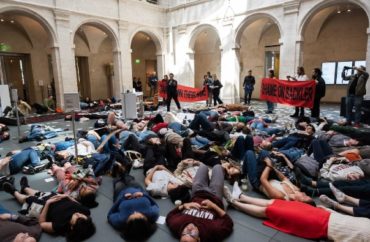
Anti-opioid group ‘stands in solidarity with student movements calling on Harvard to sever the university’s ties to the legacy of white supremacists’
Harvard University students continue their fight against the university’s association with the Sackler family, owners of the OxyContin producers Purdue Pharma, in partnership with an outside advocacy group.
An online petition titled “Tell Harvard: Cut Ties With Makers of OxyContin” has 14,856 signatures as of May 10, just shy of the petition’s goal of 15,000.
More than 50 students posed as corpses on the floor of the Harvard Art Museums or tossed empty pill containers and bloodied paper money from the second-floor balcony in an April protest. Some of the protesters at the Harvard Art Museum chanted slogans such as “No More Drug War,” “Take Down the Name,” and “Shame on Sackler.”
The protesters called on the Ivy League school to remove the drug company owner’s name from all university buildings, including the Arthur M. Sackler Building and Arthur M. Sackler Museum, according to The Crimson. Protesters also demanded the university increase the supply of naloxone on campus, a medication that can quickly reverse an opioid overdose.
In a statement shortly following the April protest at Harvard, university spokesman Jason Newton stated that the university is “reviewing a proposal to dename the two buildings,” according to The Crimson.
The event was co-sponsored by Harvard Student Labor Action Movement and the outside advocacy group P.A.I.N., The Harvard Crimson reported. P.A.I.N. stands for Prescription Addiction Intervention Now.
Harvard’s Student Labor Action Movement “is committed to activism and education in support of social and economic justice and organizes in support of workers’ rights and a more equitable Harvard community,” according to its website.
The efforts denouncing the Sackler connection the to Ivy League university dates back at least five years.
Harvard College Overdose Prevention and Education Students, a campus group promoting drug overdose awareness, submitted a 23-page request last fall asking for the Sackler name to be removed from campus, The Crimson reported.
PAIN co-sponsored a similar protest with Harvard students in 2018, ArtNews reported that year. PAIN also sponsored protests at other prominent organizations that have received Sackler donations and promoted the family’s name, such as the Metropolitan Museum of Art in New York City and the Louvre in Paris.
“Largely because of PAIN’s activism, most of those institutions have taken the Sackler name off their walls and said they will no longer accept gifts from the family’s members,” according to ArtNews. “The Arthur M. Sackler Museum [at Harvard] remains an outlier.”
The Fix twice reached out by email to Harvard’s media office for comment and to ask how Harvard will respond to the “die-in.” No response has been received. Harvard Student Labor Action Movement also did not respond to requests for comment.
Nan Goldin, a Harvard alumna and former opioid user, founded P.A.I.N. “to put pressure on Purdue Pharmaceuticals, the makers of OxyContin, and some members of the Sackler Family, the company’s principal owners,” according to ARTNews. P.A.I.N. demands that the Sackers fund treatment programs.
The Fix reached out to Goldin via Twitter but has not received a response.
Arthur Sackler funded Harvard’s art museum by donating millions in 1980 for the construction of the building, according to The Crimson.
Brothers Mortimer, Raymond and Arthur Sackler bought the drug company known as Purdue Frederick, later renamed Purdue Pharma, in 1952, Fox17 reported.
Purdue Pharma introduced the painkiller drug OxyContin in 1996, according to an article in the February 2009 issue of American Journal of Public Health. The company marketed and promoted the drug “aggressively” and falsely claimed it was safe and non-addictive. Sales reached nearly $1.1 billion in 2000.
Thousands of lawsuits were brought against Purdue, which reached a $10 billion settlement in March 2022, according to the AP. The settlement “calls for members of the Sackler family to give up control of the Stamford, Connecticut-based company so it can be turned into a new entity with profits used to fight the crisis.” No Sackler family members were charged with a crime.
“Sackler family members have not unequivocally offered an apology but issued a statement of regret about the toll of OxyContin, its signature painkiller, which users learned could be manipulated to produce quick highs,” according to the AP.
‘All were united in denouncing the influence of corrupt philanthropists,’ PAIN wrote
“It was an honor to organize with such a committed group of students representing many different fields of study at the university,” P.A.I.N. wrote on Instagram on April 20. “All were united in denouncing the influence of corrupt philanthropists at their school.”
Even more, “P.A.I.N. stands in solidarity with student movements calling on Harvard to sever the university’s ties to the legacy of white supremacists and slaveowners, whose names are displayed across campus,” the group stated.
Arthur Sackler died in 1987, years before OxyContin came to market, The Crimson reported in 1996. However, activists have argued that elder Sacker’s marketing tactics dramatically increased the sales of the drug.
His widow has spoken out in his defense.
“None of the charitable donations made by Arthur prior to his death, nor that I made on his behalf after his death, were funded by the production, distribution or sale of OxyContin or other revenue from Purdue Pharma,” Jillian Sackler, Arthur’s wife, wrote in a disclaimer posted to Sackler.org.
“Passing judgment on Arthur’s life’s work through the lens of the opioid crisis some 30 years after his death is a gross injustice,” she continued.
Nonetheless, Harvard’s protesters rejected his legacy.
“We are here today to call out Harvard for supporting the Sacklers — a family of billionaires that profited off our pain for generations starting with Arthur Sackler,” P.A.I.N. activist Harry Cullen said at the Harvard protest in statements echoed by the crowd, The Crimson reported.
“Five years ago, Nan Goldin and PAIN came here to show Harvard the way to reject the Sackler legacy,” Cullen said. “Now Harvard students have brought PAIN back to repeat our demands: take down the Sackler name.”
MORE: Colleges increasingly embrace programs to help students battle drug addiction
IMAGE: @Zoe_Leoudaki/Twitter
Like The College Fix on Facebook / Follow us on Twitter






Please join the conversation about our stories on Facebook, Twitter, Instagram, Reddit, MeWe, Rumble, Gab, Minds and Gettr.